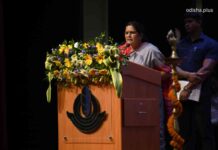By John F. Burns

Biju Patnaik, one of the most prominent survivors of the generation of Indian leaders who took part in the independence struggle against Britain, died here on Thursday. He was 81.
Mr. Patnaik twice served as Chief Minister of Orissa, a state in eastern India with a population of more than 30 million people from 1961 to 1963, when he was credited with steps that began its industrialization, and again from 1990 to 1995.
But his reputation in India rested less on his performance as state government leader, or on his brief tenure as a Cabinet minister in the late 1970’s in the Government in New Delhi, than on his daring exploits as a pilot in the years before and soon after India’s independence in 1947.

Inspired by a boyhood meeting with Mohandas K. Gandhi during a visit by the independence leader to Orissa in 1927, Mr. Patnaik trained as a pilot at the Delhi Flying Club in the 1930’s and then found novel ways to put his skills to work for the freedom struggle. Enlisting in the Royal Air Force, he combined derring-do on behalf of the British forces fighting the Japanese in Burma with secret missions on behalf of the independence movement.
For dropping political leaflets to Indian soldiers fighting under British command in Burma and flying clandestine missions that carried Congress Party leaders from hideouts across India to secret meetings that charted the independence struggle, he was jailed by the British in 1942 and imprisoned until 1946, a year before Britain transferred power to a Congress Party Government. He then switched his efforts back to aviation, founding his own carrier, Kalinga Airlines, and becoming its chief pilot. The airline later became part of Indian Airlines, the state-owned carrier.
In the first decade after independence, Mr. Patnaik concentrated on business, building an industrial empire in Orissa that included textile mills, iron ore and manganese mines, a steel mill and plants manufacturing domestic appliances.

All the while, he kept up his flying exploits, winning renown for daredevil flights that carried Indian soldiers into battle in Kashmir in 1947, and with a mission in 1948 at the direction of Prime Minister Jawaharlal Nehru, in which Mr. Patnaik rescued two key Indonesian independence leaders from a remote hideout in Indonesia and flew them to India, outraging the Dutch colonialists then ruling Indonesia.
”Resurgent India does not recognize Dutch colonial sovereignty over the Indonesian population,” he said.
Mr. Patnaik’s political career was less successful. Although he was widely credited with developing an industrial base in Orissa, one of India’s poorest and least developed states, his two stints as Chief Minister were dogged by political feuding and accusations of corruption.
(New York Times editorial on 21 April 1997)

























